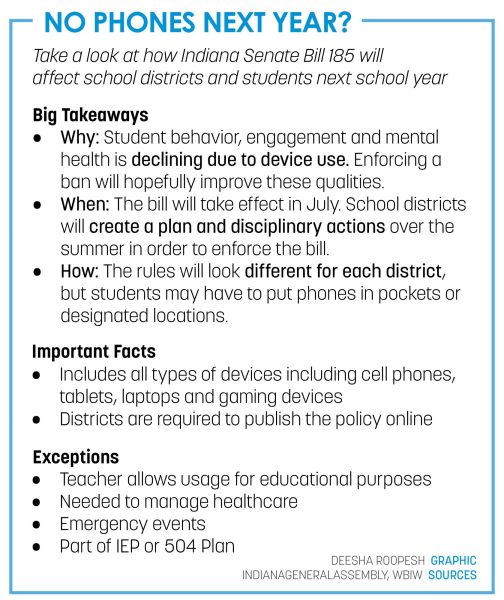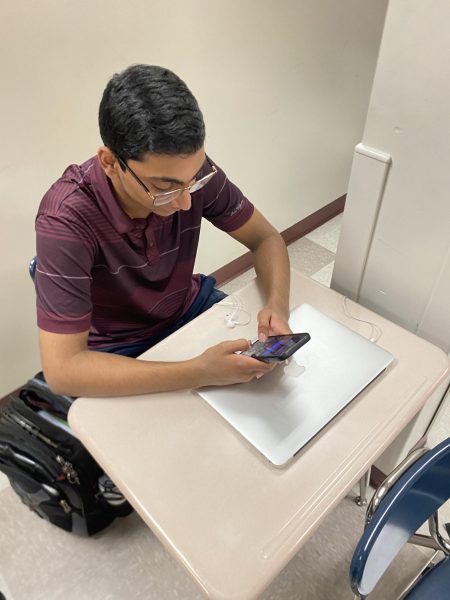
On March 11, Indiana Senate Bill 185 was signed into law by Gov. Eric Holcomb. The legislation requires school districts to create policies which restrict the use of “wireless communication devices” such as phones, tablets and laptops during class time. Beginning with the 2024-25 school year, the use of personal devices will only be allowed with the express permission of a teacher for educational purposes. However, there are a few exceptions, as students will be allowed to access their devices for emergencies, their personal healthcare or under specialized education programs. The bill was a massive bipartisan effort, supported by 49 of the 49 casted votes in the Senate and 83 of the 91 casted votes in the House.
Citing distractions and mental health issues due to social media, many other states have also begun to push for restricting the use of personal electronics. Florida has already banned phones in the classroom, while state legislatures in Kentucky, Tennessee, Vermont and Oklahoma are currently considering restrictions and bans of their own.
Principal Tim Phares said the administration was already aware of the bill before it was passed.
“We do a lot of proactive work in monitoring the bills that are being proposed,” Phares said. “We were aware of this bill and it coming out. We think there is still a lot of interpretation left about the law.”
The new law does not discuss the specific methods which could be used to enforce the personal device ban, instead pushing the responsibility of enforcement off to school districts. Phares said the school’s policy remains up in the air.
“For us, I don’t know exactly where it’s going to go just yet, but that kind of speaks to the whole gamut for what this could look like,” Phares said. “We work with the district on the student handbook, and so that may be something we have to update this summer. We want those things to align so if the school board does adopt a new policy regarding this, then we will have to adapt our handbook.
Phares also said enforcing any new phone policy would be an effort requiring administrators, teachers and parents alike.
“The one challenge with all of this is it becomes another thing that our administrators and teachers will have to police, so to speak,” Phares said. “When we call home with a consequence, parents will have to be willing to support that. This is, like anything right now is, it seems to be like you are on one side or the other. It’s very polarizing.”
Currently, this school’s handbook says phones generally should be put away during class. The current guidelines also give teachers complete control over the use of personal electronic devices during instructional time and allows them to form their own personal policies. Thus, at this school, phone policies can vary widely between classrooms.
Chemistry teacher Sandy Weisner said she requires students to put their phone in a community pocket container on certain days, such as test days, but she allows phones to be stowed in a backpack on other days. Business teacher Carey Anderson said she prohibits the use of phones during class time, but only requires students to put their phone in a community container during assessments.
However, Anderson said her policy has changed in the past.
¨Before the pandemic, I wanted all the phones on the phone wall away from students during class time,” Anderson said. “During the pandemic, I had less students and I had to worry about keeping the wall sanitized for all students’ hands going in and out, so I eventually stopped doing that. I am personally still on the fence on whether I want (students) to go back to when I started teaching high school where they would turn it in during the beginning of class.”
In her classroom, Anderson said she makes extensive use of school-provided personal computers. Although these computers are also able to access the Internet, Anderson said the use of computers is necessary in her classroom.
“I think computers are tools. We have dual screens, which is very useful for working and multitasking and often is not a problem for me. It’s the blatantly, ‘I’m on my phone instead of working,’ that pushes the limits of my policy and then I have to intervene,” Anderson said.
Anderson said phones provide an important function as a safety mechanism which allows students to communicate. Although she said phones can be very useful, Anderson also said she believes the ban is necessary.
“The pandemic has placed some students behind academically,” Anderson said.During the pandemic, (students) were isolated away from social events which school provided. So then a student is looking for a way to connect with their friends, and they often did that digitally which interfered with their learning.”
Similarly, Weisner said the bill would be helpful for her classroom environment.
“I think it’s so easy to worry about if a text is coming in or a message from a friend. You wait for it and you’re not really focusing on the teacher or classmates,” Weisner said. “Once again, learning to communicate with other classmates and actually speaking is really important. From what I understand about the bill, I think every time my students come in I would tell them to put their phones in the pockets. I think I would have them do it every day for sure.”
However, like some other parents and teachers across the state, Weisner said she considered the move to be unexpected.
Weisner said, “I was surprised that the state said something. I thought maybe the schools themselves should’ve said something, and I guess some schools maybe don’t have a policy at all. I’m not sure why the state thought they had to make the policy, but I am hoping that it would help many schools that thought they could not do it. We will have to see what the district does and how they communicate it to parents.”

Junior Aarush Krishna said the bill would not affect him much, but said he acknowledged the bill could affect other students who do use their phone more often.
“Personally, I am not on my phone that much during class. However, I do know that there are many students who want to use their phone during class, sometimes for legitimate reasons which may not qualify as an emergency under this bill,” Krishna said. “I feel some classrooms would get a lot more focused and productive, but the amount of positive change will be different between different teachers and different classes. The current school policy of letting the teachers decide I think has worked fine for me so far.”
Krishna also said the bill could cause other minor inconveniences in the classroom.
“In some classes, it’s just a lot easier to use my phone to do work, even though teachers might want us to use a laptop,” Krishna said. “Also, when I use my phone for emergencies, it is usually because my parents want to contact me, not because there is an actual emergency at the school. I feel like the bill can block the connection to my family that my phone gives me.”
Phares said phones were a question for the community as a whole.
“I would just say that we have a lot to learn,” Phares said. “I think we all have opinions on the pro and con of the phone, but I think we need to figure out as a school district and a community what we want. Ultimately, we want our kids to learn.”
















































































![Review: “The Immortal Soul Salvage Yard:” A criminally underrated poetry collection [MUSE]](https://hilite.org/wp-content/uploads/2025/03/71cju6TvqmL._AC_UF10001000_QL80_.jpg)
![Review: "Dog Man" is Unapologetically Chaotic [MUSE]](https://hilite.org/wp-content/uploads/2025/03/dogman-1200x700.jpg)
![Review: "Ne Zha 2": The WeChat family reunion I didn’t know I needed [MUSE]](https://hilite.org/wp-content/uploads/2025/03/unnamed-4.png)
![Review in Print: Maripaz Villar brings a delightfully unique style to the world of WEBTOON [MUSE]](https://hilite.org/wp-content/uploads/2023/12/maripazcover-1200x960.jpg)
![Review: “The Sword of Kaigen” is a masterpiece [MUSE]](https://hilite.org/wp-content/uploads/2023/11/Screenshot-2023-11-26-201051.png)
![Review: Gateron Oil Kings, great linear switches, okay price [MUSE]](https://hilite.org/wp-content/uploads/2023/11/Screenshot-2023-11-26-200553.png)
![Review: “A Haunting in Venice” is a significant improvement from other Agatha Christie adaptations [MUSE]](https://hilite.org/wp-content/uploads/2023/11/e7ee2938a6d422669771bce6d8088521.jpg)
![Review: A Thanksgiving story from elementary school, still just as interesting [MUSE]](https://hilite.org/wp-content/uploads/2023/11/Screenshot-2023-11-26-195514-987x1200.png)
![Review: "When I Fly Towards You", cute, uplifting youth drama [MUSE]](https://hilite.org/wp-content/uploads/2023/09/When-I-Fly-Towards-You-Chinese-drama.png)
![Postcards from Muse: Hawaii Travel Diary [MUSE]](https://hilite.org/wp-content/uploads/2023/09/My-project-1-1200x1200.jpg)
![Review: "Ladybug & Cat Noir: The Movie," departure from original show [MUSE]](https://hilite.org/wp-content/uploads/2023/09/Ladybug__Cat_Noir_-_The_Movie_poster.jpg)
![Review in Print: "Hidden Love" is the cute, uplifting drama everyone needs [MUSE]](https://hilite.org/wp-content/uploads/2023/09/hiddenlovecover-e1693597208225-1030x1200.png)
![Review in Print: "Heartstopper" is the heartwarming queer romance we all need [MUSE]](https://hilite.org/wp-content/uploads/2023/08/museheartstoppercover-1200x654.png)



